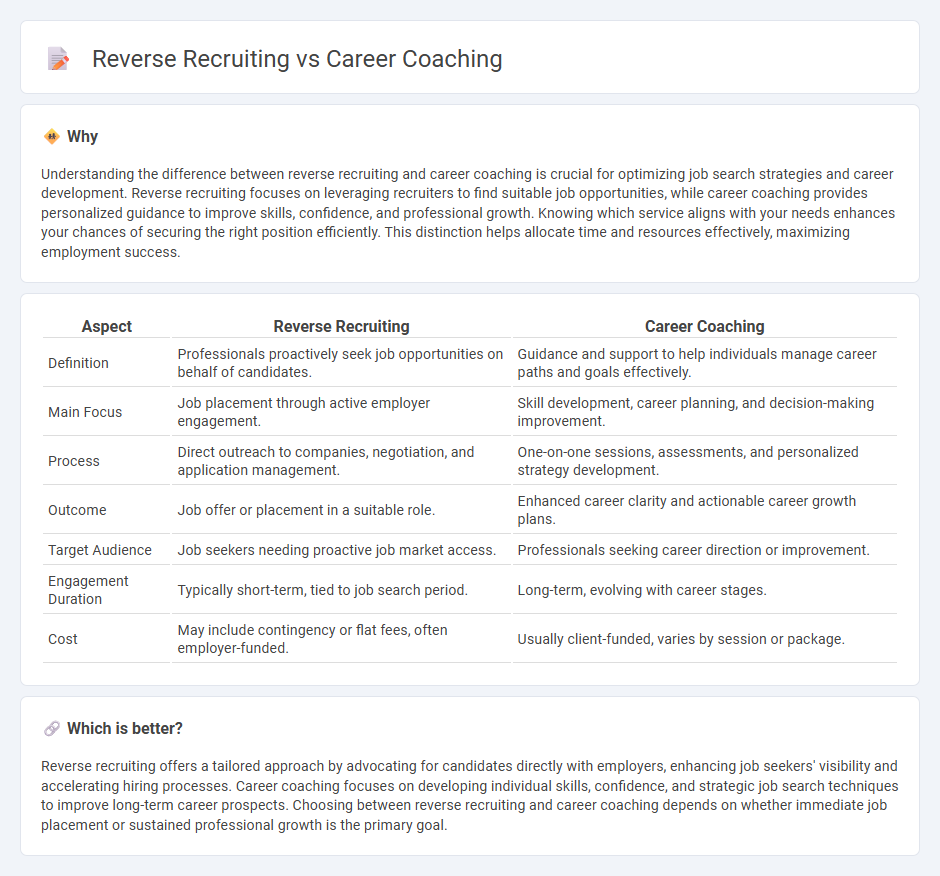
Reverse recruiting empowers job seekers by allowing them to proactively showcase their skills directly to employers, enhancing visibility in competitive markets. Career coaching focuses on personalized guidance, helping individuals clarify goals, improve interview techniques, and build confidence throughout their job search journey. Explore the distinct advantages of reverse recruiting and career coaching to optimize your employment strategy.
Why it is important
Understanding the difference between reverse recruiting and career coaching is crucial for optimizing job search strategies and career development. Reverse recruiting focuses on leveraging recruiters to find suitable job opportunities, while career coaching provides personalized guidance to improve skills, confidence, and professional growth. Knowing which service aligns with your needs enhances your chances of securing the right position efficiently. This distinction helps allocate time and resources effectively, maximizing employment success.
Comparison Table
| Aspect | Reverse Recruiting | Career Coaching |
|---|---|---|
| Definition | Professionals proactively seek job opportunities on behalf of candidates. | Guidance and support to help individuals manage career paths and goals effectively. |
| Main Focus | Job placement through active employer engagement. | Skill development, career planning, and decision-making improvement. |
| Process | Direct outreach to companies, negotiation, and application management. | One-on-one sessions, assessments, and personalized strategy development. |
| Outcome | Job offer or placement in a suitable role. | Enhanced career clarity and actionable career growth plans. |
| Target Audience | Job seekers needing proactive job market access. | Professionals seeking career direction or improvement. |
| Engagement Duration | Typically short-term, tied to job search period. | Long-term, evolving with career stages. |
| Cost | May include contingency or flat fees, often employer-funded. | Usually client-funded, varies by session or package. |
Which is better?
Reverse recruiting offers a tailored approach by advocating for candidates directly with employers, enhancing job seekers' visibility and accelerating hiring processes. Career coaching focuses on developing individual skills, confidence, and strategic job search techniques to improve long-term career prospects. Choosing between reverse recruiting and career coaching depends on whether immediate job placement or sustained professional growth is the primary goal.
Connection
Reverse recruiting enhances employment opportunities by allowing candidates to actively market their skills to employers, creating a proactive job search approach. Career coaching supports this process by helping individuals identify strengths, tailor personal branding, and develop strategic plans to engage with recruiters effectively. Together, reverse recruiting and career coaching increase job placement success through targeted self-promotion and professional guidance.
Key Terms
Guidance
Career coaching offers personalized guidance to help individuals identify strengths, set goals, and develop strategies for career advancement. Reverse recruiting involves recruiters proactively presenting job opportunities to candidates, focusing on matching skills with market demand. Explore the differences in approach and benefits to choose the right path for your career growth.
Candidate Advocacy
Career coaching empowers candidates by enhancing their skills, confidence, and job search strategies to attract optimal career opportunities. Reverse recruiting centers on proactive employer outreach, where recruiters advocate for candidates by matching their talents directly with suitable roles. Explore the nuances of candidate advocacy to determine which approach best accelerates your career journey.
Job Search Strategy
Career coaching provides personalized guidance to enhance job search strategies, including resume optimization, interview preparation, and networking tactics tailored to individual goals. Reverse recruiting shifts the dynamic by having recruiters actively seek out candidates based on their skills and career aspirations, streamlining the job matching process. Explore how each approach can transform your job search strategy for better career outcomes.
Source and External Links
What is Career Coaching and its Advantages - Growthspace - Career coaching is personalized guidance from an external expert to help employees make career choices, develop professional skills, and prepare for advanced roles or transitions, often through one-on-one sessions that can be conducted in person or virtually.
What is career coaching? 4 signs you need a career coach - BetterUp - A career coach assists individuals with setting goals, navigating transitions, improving job search skills, and building a personal brand, offering tailored support to help each person reach their unique career potential.
Want to Use AI as a Career Coach? Use These Prompts. - Harvard Business Review - Emerging AI tools can now support career coaching by helping with resume optimization, job search strategies, and career clarity, providing more accessible alternatives to traditional, often costly, coaching services.
 dowidth.com
dowidth.com